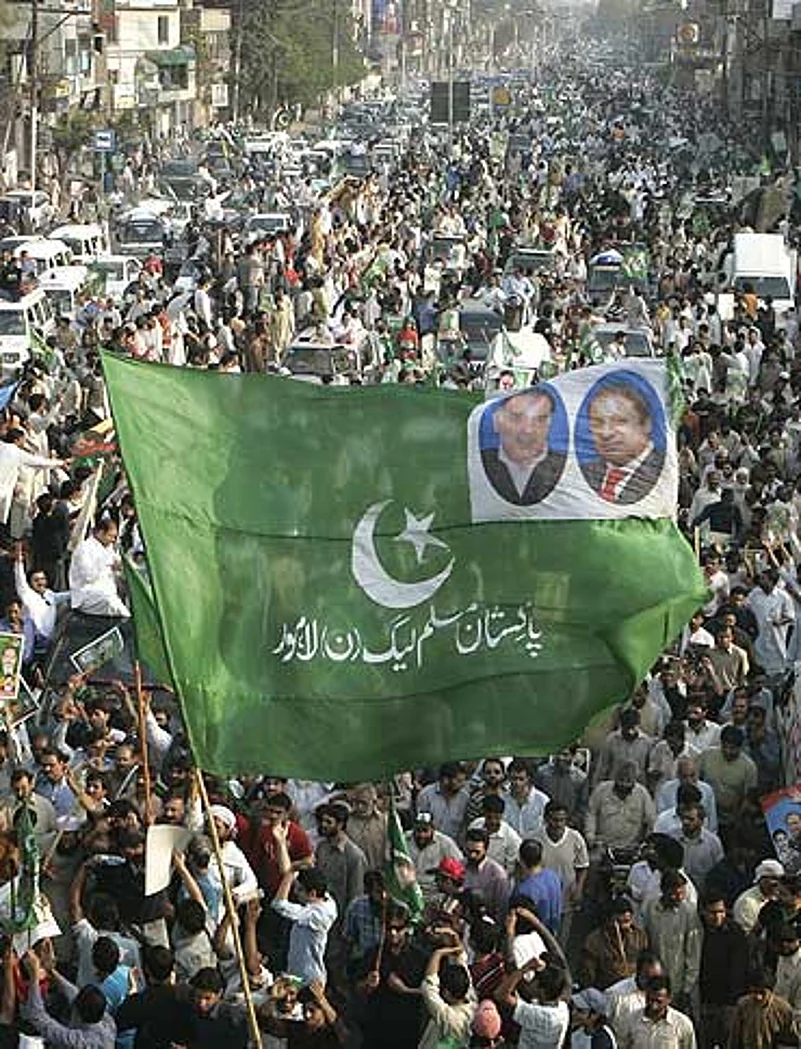
And on March 16, at 5.49 am, Prime Minister Yousuf Raza Gilani announced the restoration of the Supreme Court and High Court judges whom Musharraf had sacked summarily on November 2, 2007. Pakistan broke out in wild celebration; the Long March had achieved its goal without reaching its destination. From the balcony of his residence in Islamabad, Chaudhry told hundreds of cheering people, "I salute you on this historic success, it's your victory, it's the triumph of justice and righteousness."
Indeed, in just a year, people's power had triumphed twice in Pakistan—it compelled Musharraf the dictator to quit the presidency, and then last week, it forced Zardari to resile from his position of not reinstating Chaudhry. Perhaps civil society had attained a maturity no Pakistani ruler could ignore. Asma Jahangir, the chairperson of Pakistan's Human Rights Commission, told Outlook, "As a nation, we owe a debt of gratitude to the lawyer community for their valuable contribution to establishing the rule of law and for strengthening of the judiciary's independence. The nation's thanks are also due to civil society and the political leaders and activists who put their weight behind the lawyers' movement."
Dr Tariq Rahman, an analyst, thinks Pakistan's "soft revolution" (because it was non-violent) has demonstrated that people's power can overthrow dictatorships. He told Outlook, "In a truly democratic country, this power is expressed through the ballot, but in developing countries like Pakistan, which only has the trappings of a democracy, people have to come out on to the streets to force a change. In Pakistan, this has happened in 1968-69, 1977 and from 2007 onwards."
But what makes 2007-09 different from 1968-69 and 1977 is that it didn't lead to army rule. When popular resentment against Field Marshal Ayub Khan boiled over in 1968-69, he handed over power to the then army chief, Gen Yahya Khan, instead of holding elections. Similarly, when massive protests erupted against the rigging of elections by prime minister Zulfiqar Ali Bhutto, Gen Zia-ul-Haq stepped in. But this time, army chief Gen Ashfaq Kayani not only refrained from fishing in troubled waters, but, quite commendably, even persuaded Zardari to bow to people's might.
Such was the democratic upsurge in the people that it could even dissuade an army chief with overweening ambitions from grabbing power. This is why analyst Nasim Zehra thinks the March 16 Long March marks a new beginning in Pakistani politics. She explained in The News, "This largely urban-based movement will become a part of Pakistan's home-grown narrative, providing optimism, determination and a sense of direction to the millions in Pakistan now seeking to reform the Pakistani state, politics and society in accordance with the Constitution." Rasul Bakhsh Rais, a professor of political science at Lahore University of Management Sciences (LUMS), agrees. He says, "The restoration of the judges has restored the nation's self-esteem and has given new confidence to civil society—that a government subservient to law and working within constitutional limits is no longer a dream."
Ultimately, the movement succeeded, says political economist Mosharraf Zaidi, because it enjoyed moral superiority (who could deny that Chief Justice Chaudhry had been unjustifiably sacked) that was simply overwhelming. He feels the institutional morality of courts protecting the weak can be sustained only through political action—like that of the young men and women who participated in the Long March. "It's they who represent the new Pakistan," Zaidi told Outlook.
The Long March holds out two important lessons to the governing class, says former diplomat Javaid Husain. First, the threat or use of force is not the appropriate answer to a political problem. As Husain told Outlook, "The media, civil society, and the people in Pakistan have awakened. The days when governments could ride roughshod over them are gone forever. They will have to be sensitive to public opinion in the formulation of their internal and external policies."
The second lesson, Husain says, is that victory in the election does not mean that people should quietly accept whatever a government does till the next election. "Constant vigilance is the essence of democracy. The people have every right, in fact, the duty, to keep their governments under close scrutiny and ensure that they don't go astray as had happened with the ppp-led government in Islamabad." Amen.

















